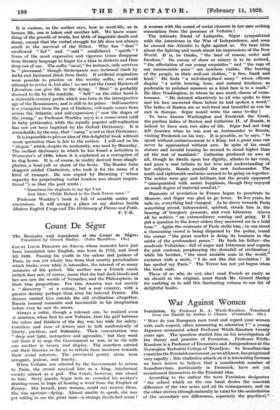Count De Segur
The Memoirs and Anecdotes of the Count de Segur. Translated by Gerard Shelley. (John Hamilton. 15s.)
Coiner Lours PHILIPPE DE Skoun, whose memoirs have just been translated into English, was born in 1753, and lived till 1830. Passing his youth in the salons and palaces of Paris, he was yet wholly free from that courtly parochialism which limits, even while it intensifies, the interest of so many memoirs of the period. His mother was a French creole (which does not, of course, mean that she had dark blood) and her son saw the worlds of Versailles, and the Philosophers, in their true proportions. For him America was not merely a " discovery " or a colony, but a real country, with a greater destiny perhaps than even his beloved France. His dreams carried hloa outside the old civilization altogether. Russia loomed romantic and inscrutable in his imagination before ever he saw its snows.
Always a critic, though a tolerant one, he realized even st nineteen, when first he saw Voltaire, that the gulf between the rulers and thinkers of the day was too wide for safety. Courtiers and men of letters met to talk academically of liberty, pacifism, and fraternity. Their conversation was " deep and light, instructive and agreeable," but they went out from it to urge the Government to war, or to vie with one another in luxury and display. The courtiers carried out their theories so far as to refrain from insolence towards their social inferiors. The provincial gentry alone were arrogant, jealous, and touchy.
When Voltaire was allowed by the Government to return to Paris, the crowd received him as a king, intellectual society almost as a god. The Court, however, was closed to him. Sixty guests, Segur tells us, crowded his mother's drawing-room in hope .of hearing a word from the Prophet of Ferny. She herself, poor woman, could not receive them. She was upstairs—dying. Almost unable to speak, she was yet. willing to see the great man—a strange death-bed scene
A woman with the sound of social clamour in her ears seeking consolation from the presence of Voltaire 1
The intimate friend of Lafayette, Segnr sympathized with the Americans in the War of Independence, and soon he crossed the Atlantic to fight against us. We hear little about the fighting and much about his impressions of the New World. It is, he thinks, " the land of reason, order and freedom." No excess of show or misery is to be noticed, " the affectation of our young exquisites " and " the rags of our innumerable poor " are nowhere visible. The bearing of the people, in their well-cut clothes, " is free, frank and kind." He finds " a well-disciplined army " whose officers display " a noble bearing, tone, and natural kindness, as preferable to polished manners as a kind face is to a mask." He likes Washington, in whom he sees much charm of coun- tenance. " He listened attentively to all who spoke to him and his face answered them before he had spoken a word." The ladies of Boston are as well-bred and beautiful as can be met in Europe. Segur would write the same to-day I To have known Washington and Frederick the Great, the puritan ladies of Boston and Catherine II. of Russia, is indeed to have seen two sides of life. Segur had not long left America when he was sent as Ambassador to Russia, visiting Frederick on his way. It is possible, as he says, " to speak without embarrassment to a King, but a great man can never be approached without awe. In spite of his small stature and invalid bearing he seemed to stand higher than all the rest of mankind." Catherine produced no awe at all, though he dwells upon her dignity, alludes to her vices, and pays a real tribute to her love and understanding of her subjects. Russia puzzled the new Ambassador. The tenth and eighteenth centuries seemed to be going on together. The nobles were gay and brilliant, but the people appeared " unacquainted with moral happiness, though they enjoyed no small degree of material comfort."
Rumours of revolution in France began to penetrate to Moscow, and Segur was glad to go home. In five years, he tells us, everything had changed. As he drove towards Paris something proud, independent, spirited, struck him in the bearing of bourgeois peasants, and even labourers. Above all he notices " an extraordinary coming and going. If I put a question to the lower orders they answered me in a bold tone." Again the contrasts of Paris strae him ; in one street a clamouring crowd is being dispersed by the police, round the corner " the great market is doing its business in the midst of the profoundest peace." He finds his father—the academic Voltairian—full of anger and bitterness and regrets for past customs, prophesying the downfall of civilization ; while his brother, " the most amiable man in the world," exclaims with a smile, " I do not like this revolution ! It has spoiled my Paris." The Terror has not yet begun when the book ends.
Those of us who do not, alas ! read French as easily as we should in the original, must thank Mr. Gerard Shelley for enabling us to add this fascinating voluthe to our list of delightful books.






































 Previous page
Previous page